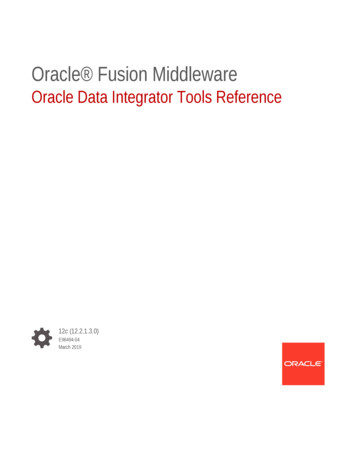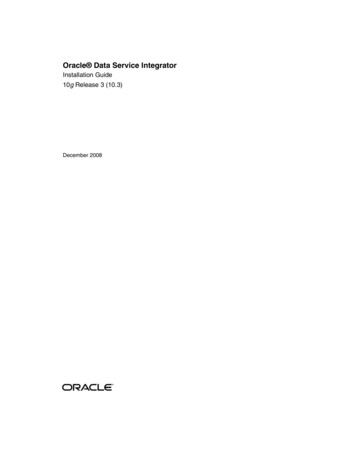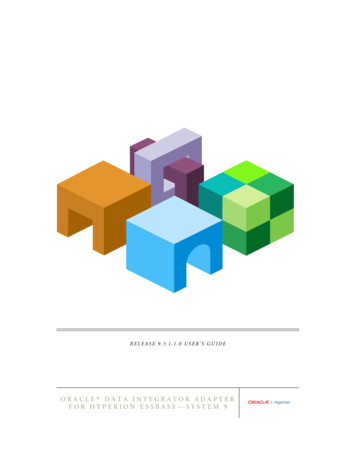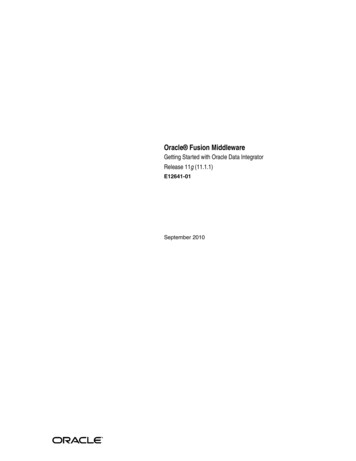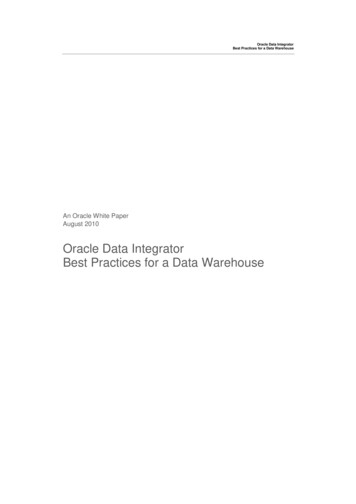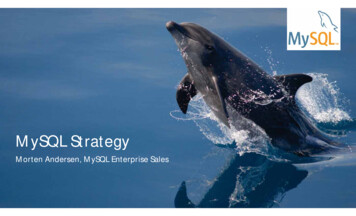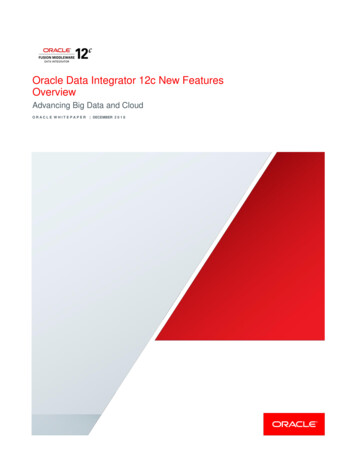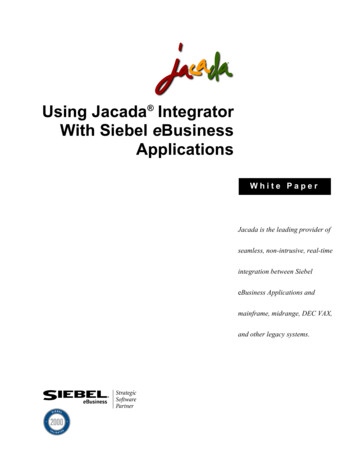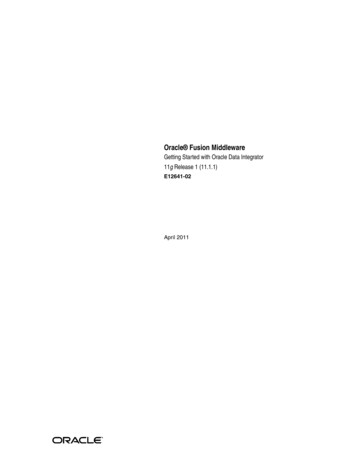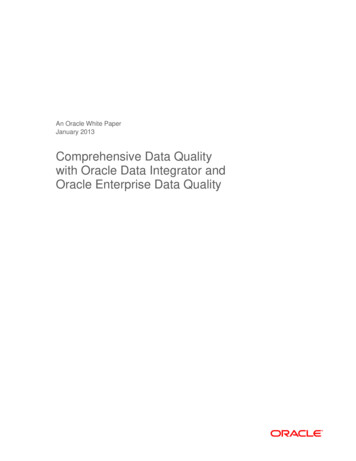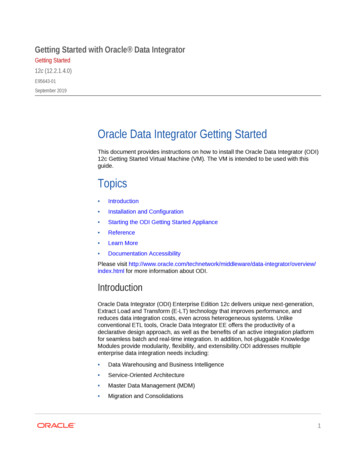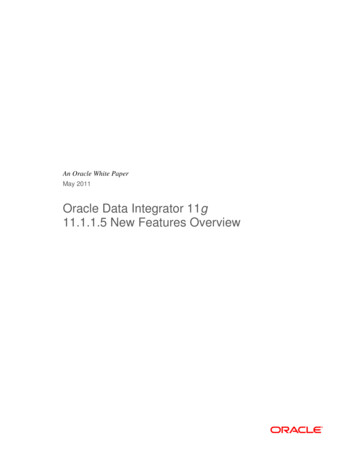
Transcription
An Oracle White PaperMay 2011Oracle Data Integrator 11g11.1.1.5 New Features Overview
Oracle White Paper—ODI 11gR1 PS1 New Features OverviewDisclaimerThis document is for informational purposes. It is not a commitment to deliver any material,code, or functionality, and should not be relied upon in making purchasing decisions. Thedevelopment, release, and timing of any features or functionality described in this documentremains at the sole discretion of Oracle.This document in any form, software or printed matter, contains proprietary informationthat is the exclusive property of Oracle. This document and information contained hereinmay not be disclosed, copied, reproduced, or distributed to anyone outside Oracle withoutprior written consent of Oracle. This document is not part of your license agreement nor canit be incorporated into any contractual agreement with Oracle or its subsidiaries or affiliates.1
Oracle White Paper—ODI 11gR1 PS1 New Features OverviewExecutive OverviewOracle Data Integrator (ODI) is a best-of-breed data integration platform focused on fast bulkdata movement and handling complex data transformations.Oracle Data Integrator is fully integrated with the Oracle technology stack, including OracleDatabase, Exadata Database Machine, Business Intelligence, and Oracle Applications. ODI is thestrategic data integration platform for Oracle.The 11g version of ODI has pushed the state of the art technology in data integration furtherahead of the rest of the industry. Since the first 11g release in July 2010, Oracle has continued itsinvestments on this strategic data integration platform.For this new ODI 11.1.1.5 patch level, Oracle has consolidated 18 one-off patches andincluded new fixes for many other bugs. This whitepaper describes in detail some of the newbug fixes, and explains more about the new features and capabilities offered in the 11.1.1.5version of the Oracle Data Integrator 11g platform.2
Oracle White Paper—ODI 11gR1 PS1 New Features OverviewFeature Highlight: SOA and Application IntegrationOracle Data Integrator is the only ETL tool that can run entirely within a Service OrientedArchitecture. ODI is the most deeply integrated ETL product for running data integration as aservice, accessing web services and writing to web services as a target. ODI 11.1.1.5 has beenfurther enhanced for facilitating application integration and more advanced interaction with aSOA stack.Complex File TechnologyComplex file formats (multiple record files) can now be integrated using the new Complex Filetechnology. This technology leverages a new built-in driver that converts transparently complexfile formats into a relational structure using a Native Schema (nXSD) description file.Figure 1 – Complex files described with the Native Format Builder can be integrated in Oracle Data Integrator.With ODI 11.1.1.5 the nXSD formats may be created manually, or with a graphical tool calledthe Native Format Builder Wizard (included with BPEL Process Manager). The Native FormatBuilder Wizard guides you through the creation of a native schema file from the followingformats shown in Figure 1. A sample data file format for the selected type must already exist; youcannot create a native schema without one. You can also select to modify an existing nativeschema previously created with this wizard, except for those generated from a Document TypeDefinition (DTD) or COBOL copybook.3
Oracle White Paper—ODI 11gR1 PS1 New Features OverviewWeb Services EnhancementsWeb service support in Oracle Data Integrator has been enhanced with the following capabilities:Web Service Container Based AuthenticationWhen external authentication and container based authentication with Oracle Platform SecurityServices (OPSS) are configured, authentication can be passed to the ODI Run-Time WebServices using HTTP basic authentication, WS-Security headers, SAML tokens and so forth.Asynchronous Web Services and CallbacksOracle Data Integrator batch jobs are long running sessions in a web service context. Longrunning transactions are handled using asynchronous web service calls and callbacks. Startingwith this release, a scenario or session can be started using the Run-Time Web Services on a oneway operation. When the session completes, the result of the execution can trigger an operationon a callback address. This pattern can be used for handling any WSAddressing compliant longrunning sessions, started for example with Oracle BPEL.Full SOAP Support for Outbound CallsThe OdiInvokeWebService tool now supports full-formed SOAP messages as an input, includingthe SOAP header and body. Access to the SOAP header improves the ease of interaction withweb service security, authentication, and other application-specific information.Features Highlights: BI and Data WarehousingThe following features have been added in this patch level for customers using Oracle DataIntegrator in Business Intelligence and Data Warehousing Projects.Load PlansOracle Data Integrator is often used for populating very large data warehouses. In these usecases, it is common to have thousands of tables being populated using hundreds of scenarios.The execution of these scenarios has to be organized in such a way that the data throughputfrom the sources to the target is the most efficient within the batch window. Load Plans help theuser organizing the execution of scenarios in a hierarchy of sequential and parallel steps for thesetypes of use cases.Load Plans are new objects introduced in this release to organize at a high level the execution ofpackages and scenarios. Load Plans provide features for parallel, sequential, and conditionalscenario execution. They also support advanced restartability and exception handling capabilities.4
Oracle White Paper—ODI 11gR1 PS1 New Features OverviewFigure 2 – Load Plans support parallel, sequential and conditional executionLoad Plans can be created and modified in production environments. They can be started,stopped, and restarted from a command line, from Oracle Data Integrator Studio, Oracle DataIntegrator Console or a Web Service interface. They can also be scheduled using the run-timeagent's built-in scheduler or an external scheduler.Load plans are not substitutes for packages or scenarios. They are used to organize at a higherlevel the execution of packages and scenarios. Unlike packages, Load Plans provide nativesupport for parallelism, restartability and exception handling. Load plans are moved toproduction as is, whereas packages are moved in the form of scenarios. Load Plans can becreated in Production environments.The Load Plan instances and Load Plan runs are similar to Sessions. The difference is that whena session is restarted, the existing session is overwritten by the new execution. The new LoadPlan Run does not overwrite the existing Load Plan Run, it is added after the previous Load PlanRuns for this Load Plan Instance. The Load Plan Instance cannot be modified at run-time.A scenario is an atomic runtime component that is given to the production. When in production,the production administrator can orchestrate the various scenarios using Load Plans in order tooptimize the time taken to execute the ETL jobs in the given timeframe and ease theadministration of all the ETL jobs.5
Oracle White Paper—ODI 11gR1 PS1 New Features OverviewFor example, the production administrator will:-Rely on Load Plans to orchestrate the execution of the various Scenarios produced bythe ETL developers as part of their own projects and will organize the productionglobally instead of a per-project approach.-Design the load plans in order to handle the parallelism of the scenarios in order to bestuse the hardware resources-Design the load plans in order to handle serial steps to avoid overloading the systemwith too many scenarios at a given time-Modify the load plans to take into account the real execution times and tune the load onthe systems-Rely on the load plans to restart only what is needed to be restarted in case of failure.This relies on the fact that the scenarios should be designed in order to be fullyrestartable (see above)Oracle Business Intelligence Enterprise Edition Data LineageOracle Business Intelligence Enterprise Edition (OBIEE) users need to know the origin of thedata displayed on their reports. When this data is loaded from source systems into the datawarehouse using Oracle Data Integrator, it is possible to use the Oracle Data Integrator Lineagefor Oracle Business Intelligence feature to consolidate ODI metadata with OBIEE and exposethis metadata in a report-to-source data lineage dashboard in OBIEE.Figure 3 – OBIEE Users can click to view the Lineage of the data from their dashboards.6
Oracle White Paper—ODI 11gR1 PS1 New Features OverviewAn important capability that Oracle has provided is the ability to view detailed metadata lineageinformation from directly within the BI Answers dashboards.Figure 4 – OBIEE Users can see the Lineage details directly in their BI dashboards.Other FeaturesIn addition to the features listed above, the following features have been included in this patchlevel.Commands on Connect/DisconnectIt is now possible to define data server commands that will be automatically executed whenconnections to this data server are created or closed by ODI components or by a session. Such acommand can be used for altering and pre-configure sessions (for example, forinternationalization of messages or forcing implicit conversions), or in multi-tenant infrastructurewhere commands must be placed at connection time to access information of a given tenant.Built-in Technology Additions and UpdatesThe following technologies used in Oracle Data Integrator have been added and updated tobenefit from their new features: Embedded HSQL engine is upgraded to version 2.0. This embedded engine is used forthe Memory Engine as well as the XML and LDAP Drivers' built-in storage Jython BSF engine is updated to version 2.1 JAX-WS/JRF is now used as a standard stack for web service calls and processing. Axisis no longer used7
Oracle White Paper—ODI 11gR1 PS1 New Features OverviewGroovy TechnologyGroovy is added to the list of scripting engines supported by Oracle Data Integrator for use inknowledge modules and procedures.Ordered and Non-Ordered Join SyntaxTechnologies can now support both the ordered or non-ordered (database-specific) syntax forjoins. The Oracle DB technology was modified to support both join syntaxes.New Method for Setting Task NamesA new setTaskName method is available to update at run-time the name of a task. This API canbe used in knowledge modules and procedures to modify at run time the task name displayed inthe log, making it more readable for production users.Shared Library for WLS AgentA new template called Oracle Data Integrator - Agent Libraries includes libraries shared by all thedeployed JEE agent in a domain, and must be deployed before the Oracle Data Integrator Agent default template or a generated template.This shared library facilitates the deployment, patching and maintenance of ODI domains, as it isdeployed once and shared by both the default and user-generated templates.Performance OptimizationThe following optimizations have been made in the design-time and run-time components toimprove their performance: Long text storage modified to use CLOBs. Agent-Repository network communications reduced at run-time Agent JDBC to JDBC loading mechanism reviewed and optimized.ConclusionWith this ODI 11.1.1.5 patch level Oracle has consolidated numerous one-off patches, andintroduced new enhancements for customers using its strategic data integration platform invarious contexts - BI, Data warehouse, Application and Service Oriented Integration - whilepreserving the key product differentiators: Declarative Design, Knowledge Modules, HotPluggability, and E-LT.8
Oracle Data Integrator 11g 11.1.1.5New Features OverviewAuthor: FX NicolasMay 2011Oracle CorporationWorld Headquarters500 Oracle ParkwayRedwood Shores, CA 94065U.S.A.Copyright 2011, Oracle and/or its affiliates. All rights reserved. This document is provided for information purposes only andthe contents hereof are subject to change without notice. This document is not warranted to be error-free, nor subject to any otherwarranties or conditions, whether expressed orally or implied in law, including implied warranties and conditions of merchantability orfitness for a particular purpose. We specifically disclaim any liability with respect to this document and no contractual obligations areformed either directly or indirectly by this document. This document may not be reproduced or transmitted in any form or by anymeans, electronic or mechanical, for any purpose, without our prior written permission.Worldwide Inquiries:Oracle is a registered trademark of Oracle Corporation and/or its affiliates. Other names may be trademarks of their respectivePhone: 1.650.506.7000owners.Fax: 1.650.506.7200oracle.com0109
Oracle Data Integrator (ODI) is a best-of-breed data integration platform focused on fast bulk data movement and handling complex data transformations. Oracle Data Integrator is fully integrated with the Oracle technology stack, including Oracle Database, Exadata Database Machine, Business Intelligence, and Oracle Applications. ODI is the
